2020 Chuck Green Fellows
-
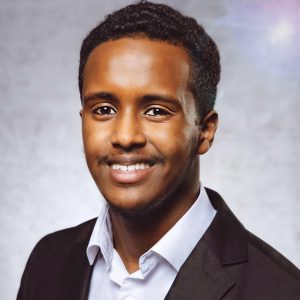
he/him/his
Class of 2022
Political Science major
ISAIAH MNFor my Chuck Green summer project, I partnered with the Muslim Coalition of ISAIAH, a faith-based organization that represents over 20 mosques in Minnesota and is dedicated to racial and economic justice in the state of Minnesota.
My project consisted of organizing Muslim communities in the northern and southern metro as a part of an effort to flip three Minnesota Senate seats. I co-led a Strategy Session and Voter Engagement Launch event that encouraged people to learn more about the current political moment and how we can utilize family, friends, neighbors, and the people in our networks to tackle structural racism and end Islamophobia and police brutality in Minnesota. Most of my day-to-day work consisted of making phone calls, door knocking to invite people to the Voter Launch event, and training people on tools for engaging in conversations with community members.
I also worked on a project called Taager, which aims to tackle the opioid crisis among Somali youth, particularly those in the Burnsville and Savage area. I invited hundreds of people to the event to bring awareness and end the stigma of addiction and mental illness within the Somali community.
One of my main goals for this fellowship was to partner with an organization that allows me to do work around shifting power dynamics so that the needs of communities are prioritized. I am glad to have had the chance to organize Muslim communities in the metro and help them claim their voices. This would not have been possible without the support of the community organizers I worked with who gave me opportunities to grow and learn more about what is at stake and how we can build power.
-
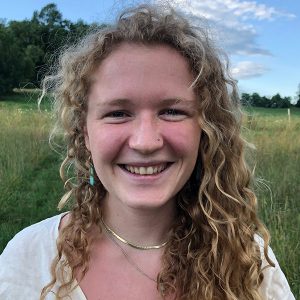
she/her/hers
Class of 2022
Political Science major, Economics minor
Minneapolis Regional Labor Federation & Research Partnership with St. Paul Public SchoolsMy Chuck Green Fellowship was full of unexpected twists and turns. I did not expect that learning how to adjust, reach out for support, and move forward would be a significant learning experience in itself. I wanted to explore my interest in union organizing and labor in the Twin Cities and I found an opportunity to join the Minneapolis Regional Labor Federation (MRLF) in an innovative pandemic-response project called the Twin Cities Hospitality and Event Workers Relief Program. As a navigator in English and Spanish, I connected with workers in the hospitality and event industries who have been hardest hit by hotel shutdowns, restaurant closures, and event cancellations due to the COVID health and economic crises. Our conversations ranged from navigating housing, food, healthcare, and childcare resources to discussing what a safe and fair workplace would look like. It was an honor to speak with them and hear their stories, provide grants, and be part of a relief effort driven by a belief in worker empowerment and value.
I also had the opportunity to join other impactful conversations and projects associated with the MRLF. This included reaching out to workers in the AFL-CIO network about their right to organize Safety Committees and the Right to Refuse, and learning about Unite Here Local 17 campaigns for hospitality workers in the Twin Cities. These conversations allowed me to hear how leaders in the labor movement are working to turn the current crisis into an opportunity to fight for workers’ rights, unionizing, and putting workers’ lives over companies’ profits. It was also incredibly valuable to meet the team of other navigators from unions and worker centers who are doing powerful organizing to build worker rights in the Twin Cities.
For the remainder of my fellowship, I joined a team of Economics and Political Science students from Macalester and St. Catherine’s University in a research partnership with a local school district to examine how their decision to delay start times in secondary schools impacted enrollment trends. Previous research suggested that start time delays encourage academic gains. However, funding and transportation constraints meant that a delayed start for middle and high school students required a corresponding shift to an earlier morning start for elementary schools. Using various econometric methodologies and the district’s enrollment and school characteristic data, our team found that this change caused declines in elementary enrollment. This suggested that the policy negatively impacted kindergarten and third grade in particular, as well as African American/Black and Asian elementary students. This research experience allowed me to practice my economic and statistical skills in a purposeful way and share the enrollment findings with the district as it navigates its future policy choices. Working with the district was an opportunity to see the immense value of community and academic collaborations that are mutually beneficial. I hope to be part of more partnerships like this at Macalester as we work to better integrate the knowledge from our academic courses with questions from our surrounding Twin Cities communities.
This summer brought incredible learning experiences, and I am grateful for the opportunities the Chuck Green Fellowship has allowed me and for my mentors who supported me along the way.
-
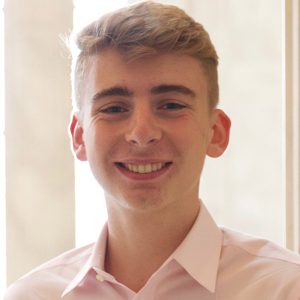
he/him/his
Class of 2022
Economics major, Political Science and Spanish minors
COPALWhen searching for a project in the winter of 2020, I believed that the U.S. Census would be the preeminent political priority in Minnesota that summer. However, once we were sent home from Macalester because of the Coronavirus, it became clear that the needs of the community were rapidly changing. This became especially pronounced during the uprisings following the death of George Floyd. For my Chuck Green Fellowship, I decided to keep some of the original focus on the Census, but transition much of my time to providing help on direct response and democratic engagement projects.
My partner organization was COPAL, Communities Organizing Latinx Power and Action, a grassroots Latinx political nonprofit. Their headquarters is located on Lake St. in Minneapolis, the heart of the Latinx community in Minnesota, and the center of damage in the uprisings. Through my work, I received a crash course on community organizing. One of the main ideas we implemented was that to organize effectively, you first have to address people’s immediate needs. Build trust, then build power. I was able to participate in both sides of that work.
My first responsibilities were phone calls in English and Spanish for COPAL’s Hola Vecin@ (Hello Neighbor) initiative. We made cold calls to members of the Latinx community in Minnesota to do wellness check-ins, connect to our navigators, help apply for unemployment, and walk them through filling out the Census. Those were done remotely, but on my first day working at the office, we had a supply distribution drive for the families on Lake St. where we provided essential resources and talked to folks about the Census and voting. Both of those experiences broadened my understanding of organizing beyond what I had learned in politics and government.
I also spent much of my time on COPAL’s Democracy 2050 and Environment campaigns. The Democracy campaign is aimed at building Latinx political power, with the short term deadline of the 2020 elections. A coworker and I built a bilingual Vote-by-Mail guide that is being shared widely on social media and physically through circles in the Twin Cities Latinx community. Using our VAN voter database, we developed plans for targeted outreach in competitive local races where Latinos have the power to swing the outcome. Finally, I partnered with the Irreducible Grace Foundation (IGF) in St. Paul to produce a government grant-funded video series. We went to Black Lives Matter events to interview community members, including the Mayor of Minneapolis, on the upcoming election.
COPAL’s Environment campaign organizes to create a sustainable future for the frontline communities that will bear the burden of pollution and climate change. My most significant project this summer was crafting and leading a volunteer training on Environmental Justice. Its purpose was to educate new volunteers on our environmental work and train them to organize in the face of a threat to their community. I designed and ran a simulation on lead contamination to give folks an opportunity to practice COPAL’s organizing principles.
I am incredibly grateful to COPAL for trusting me with so many opportunities. The Chuck Green Fellowship provided security in uncertain times, tested my capabilities, and allowed me to participate in meaningful community engagement at a critical moment in history.
-
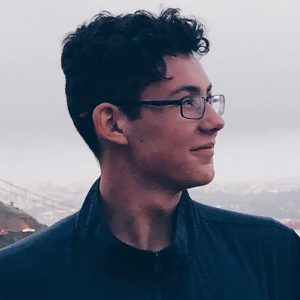
he/him/his
Class of 2022
Political Science and Latin American Studies majors, Human Rights & Humanitarianism concentration
The Lake Street CouncilThis summer, I partnered with the Lake Street Council, an organization that advocates for and support businesses in the commercial corridor of Lake Street in Minneapolis. The Lake Street Council supports local businesses through advertising and marketing, advocacy, community events, and real estate partnerships. They are a substantial resource for businesses and help them connect with each other. I wanted to work for the Lake Street Council because I volunteered to work for a grant program they were piloting. Working with them showed me the massive unmet community needs that required additional resources.
For most of my fellowship, I worked to help distribute the We Love Lake Street Recovery Grant Fund, translating and screening grant applications, following up with business owners, collecting documentation for contractors, and disbursing funds. This summer, the Fund distributed over $5 million to more than 300 businesses up and down the Lake Street Corridor that were impacted by the civil uprising in Minneapolis.
I also worked on a marketing campaign interviewing business owners on Lake Street to assess the recovery process and expand on their relationship to Lake Street. I was able to meet incredible people with amazing stories, and I gained valuable insight into just how much the Lake Street Council impacts this community.
Summer 2020 was strange and incongruous, but completing the Chuck Green Fellowship showed me how the people and organizations that are passionate and dedicated to solving community issues will rise above the circumstances and continue to fight. Perhaps the biggest lesson I learned was that even if you don’t end up where you originally wanted, there are always people who could use an extra hand, and you can always show up and make a difference.
-
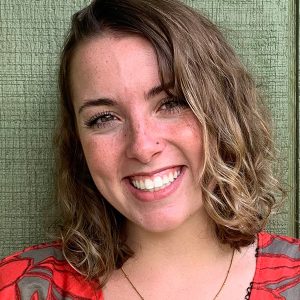
she/her/hers
Class of 2021
International Studies major, Political Science minor, Community and Global Health concentration
Neighborhood HealthsourceMy Chuck Green project was in collaboration with Neighborhood Healthsource, a community health center in Northeast Minneapolis. Because they are federally funded and serve vulnerable patient populations, community health centers had an incredibly difficult summer with COVID-19 and have been key actors in fighting the pandemic. My summer goal was to work directly with patients facing challenges navigating the complexities and inequities of our current healthcare system. I’m happy to say I was able to accomplish that goal despite the setbacks presented by the pandemic.
I worked with Neighborhood Healthsource’s community health director on an outreach project for their patients who owe the clinic high outstanding balances. Together, we developed an outreach script and I contacted patients who needed help applying for discounts, receiving insurance benefits, or paying off their balance so they could come in for health care. I became certified as a MNSure Navigator to help patients apply for public insurance. I also helped gather data about this specific group of patients so that the community health team can better address their financial and health needs in the future. I hope to continue this work with Neighborhood Healthsource throughout the academic year and help them tackle new challenges as COVID-19 progresses.
I am grateful to our Chuck Green cohort for providing a group of motivated and supportive peers during such an uncertain and challenging time in our community. Through my work, I was able to connect directly with community members in Minneapolis and reinforce the vital mission of Neighborhood Healthsource: everyone deserves quality healthcare access.
-
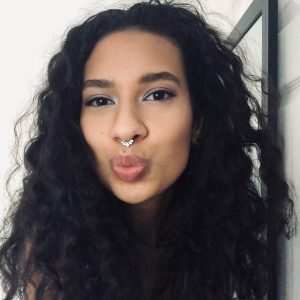
she/her/hers
Class of 2021
Political Science major, Critical Theory concentration
Walker Art Center, Family Tree ClinicIn lieu of partnering with an organization, I spoke to different community members and organizations to uncover how best to navigate my goals during a pandemic. I knew I wanted my project to center around art and minority communities, even as coronavirus spread and affected our ability to engage with the community. Art often takes a backseat to many other issues, and I was not going to let COVID-19 take over my project. If anything, isolation and quarantine emphasize the importance of the arts and finding happiness in dark times.
As part of my fellowship, I got to talk directly with artists and community members in order to best support these groups. I wanted to give artists, especially minority artists, a larger voice. In times of great distress, art can express what words cannot, and it was amazing to see these different contemporary artists promoting social justice issues they are facing through their work. I have been able to collect images of art from people across the country and forge connections between these people and their work. Additionally, I aided in creating tour guides for accessing more BIPOC art in museums like the Metropolitan Museum of Art.
Overall, I wanted to foster a larger artistic community in a time of isolation and social distancing. In creating my own structure, I was able to help individuals and organizations on their different projects. I was able to promote many different forms of arts and artists this way.
-
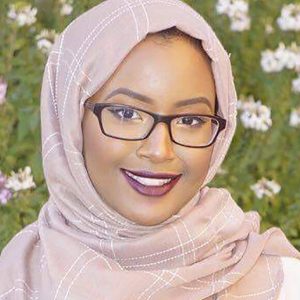
she/her/hers
Class of 2021
Political Science and International Studies majors, Legal Studies concentration
Mohamed Zain LLP, UN Research ProjectThis summer, I worked with Mohamed Zain LLC, which is a black-owned law firm in Minneapolis. I was able to get experience working with a small law firm and learn more about what is being done to help small businesses during the pandemic. I was able to help with different projects, researching and looking at loans for small businesses that were impacted.
I also worked on a research project for the United Nations with a professor from the University of Minnesota. This project studied human rights protection networks around the world and their best practices.
These two projects, although completely different, allowed me to explore multiple interests of mine this summer and to learn so much!
-
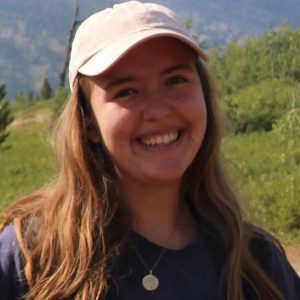
she/her/hers
Class of 2022
Political Science and Computer Science majors
Health Access MNThis summer, I partnered with Health Access MN, an organization that helps Minnesotans enroll in public health insurance programs: they sit down with Minnesotans and walk them through the processes of applying for, renewing, and staying on health insurance. Through this work, they have an on-the-ground perspective of health care in Minnesota that allows them to work with the Minnesota legislature to make Minnesota’s healthcare system more just.
I helped to develop Health Access’s outreach and health justice programs. This summer, amid rampant layoffs, pay cuts, and increased health needs due to COVID-19, Health Access was seeing fewer Minnesotans than they expected, which was concerning. Where they could typically rely on in-person visits to libraries, county offices, and community organizations to reach people who need assistance, they now needed to find people virtually.
I compiled a list of organizations in the Twin Cities that help people from various populations meet their basic needs with whom Health Access could partner. I also helped Health Access increase their online and social media presences and produced physical outreach materials, working with local libraries to list navigation services as widely as possible.
I also worked with the navigators at Health Access to compile the most common barriers to health insurance that people seeking health insurance face and to understand how these vary by race and ethnicity. Simultaneously, I studied the data related to COVID-19 infection rates and uninsured rates in MN. This was the most engaging, and difficult, aspect of my summer work. Many Minnesotans who should be eligible for health insurance can’t afford it because our healthcare system compounds and institutionalizes racist and classist barriers to health.
At its core, Health Access MN is a health justice organization. It works closely with the Minnesotans who face the most persistent structural barriers—primarily Black and Latinx individuals, people who don’t speak English, and unhoused individuals—to ensure that they obtain and maintain healthcare coverage. I learned so much this summer and am grateful to the staff at Health Access for trusting me with their stories and knowledge.
-
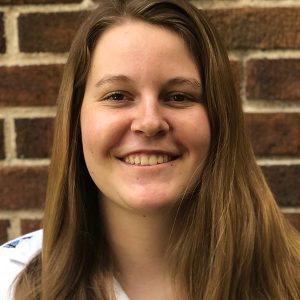
she/her/hers
Class of 2022
Political Science and Geology majors, Community and Global Health concentration
Health Access MNThis summer, I had the privilege of working at Health Access MN, an organization that helps Minnesotans enroll in healthcare coverage through the state health exchange. I was inspired to work here because of their commitment to social justice and advocacy in their daily work. Minnesota’s relatively low uninsured rate masks deep-rooted histories and contemporary realities of racism and health disparities. Health Access has an extensive mission towards ending the social injustices that constantly occur in Minnesota and to work to dismantle systems of oppression and disenfranchisement in the health field.
Once I got to Health Access, I hit the ground running. I received a crash course in Minnesota’s healthcare system and was trained as a navigator, where I became immersed in the project of removing and documenting barriers to healthcare coverage. This meant investigating data transparency laws to find data on communities most affected by healthcare policy, expanding the priority on health equity in their work, and interviewing the employees at Health Access to create a comprehensive list of barriers communities face on a daily basis.
My main projects this summer centered around providing information about access to medical care and COVID-19 testing to undocumented immigrants, an often-invisible group when talking about healthcare. In addition, I worked alongside Comunidades Organizadas el Poder y la Acción Latina (COPAL) to create a community-based referral system where we provide free information, enrollment help, and support to Latinx community members. I created an index for clinics serving low-income individuals and undocumented individuals who are ineligible for public assistance due to citizenship requirements. I also joined their development team for health justice work, where I helped craft their messages around racial injustice in light of the murder of George Floyd and create media around health equity and health justice.
This work was emotionally tiring and overwhelming, but it was wonderful to be a part of the Health Access team. Health Access MN is led by Mac alumna Kelly McAnnany. I’m fortunate and grateful to have had a supportive mentor who shares similar social justice values and made my Chuck Green summer an invaluable learning opportunity.
-
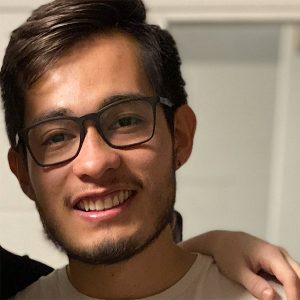
he/him/his
Class of 2022
Economics major
LEDC, Mercado el ColegioFor my Chuck Green Project, I worked with the Latino Economic Development Center (LEDC) to conduct a survey about their clients’ interests and uses of technology. I interviewed all of the department heads at the LEDC to better understand the kind of work that the organization and their clients do. Then, I conducted a SWOT (Strengths, Weaknesses, Opportunities, and Threats) analysis with all of the department heads and used the 5S (“Sort”, “Set In order”, “Shine”, “Standardize” and “Sustain”) model to analyze opportunities and strategies to start their digital transformation process.
I also reached out to Latin-owned businesses to inform them about COVID relief grants. I helped create a database with information about LEDC partner businesses and worked with business owners to fill out grant applications.
Lastly, I worked with a food distribution center at El Colegio High School. This center was created by POC teenagers as a response to the food insecurity experienced during the COVID-19 pandemic and the political turmoil caused by George Floyd’s death. Using Google Sheets and App Sheet, I helped develop a donations-tracking app that would keep a record of the inventory of the food distribution center.
-
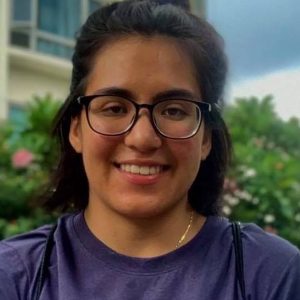
she/her/hers
Class of 2022
Global Health and International Development major and Political Science minor
Minnesota Department of Health and National Alliance on Mental IllnessFor my project, I worked on improving mental health services and education in the Twin Cities. I partnered with two organisations. First, the Suicide Prevention Team at the Minnesota Department of Health, which organises and implements state-wide efforts on suicide prevention. Second, I worked at the National Alliance on Mental Illness (NAMI) Minnesota, a grassroots advocacy group dedicated to helping educate and build public awareness to mental health issues in the local community.
My project consisted of developing and implementing a mental health and juvenile justice training for the Minnesota Department of Corrections and other community organisations. This training aimed to reduce suicide rates in the community, educate responders, and improve access to mental health services.
By partnering with two organisations, as well as collaborating with other community, state, and national health organisations, I was able to experience and directly contribute to bettering mental health services at multiple levels of care. My project was supported by a wonderful team of educators, mental health specialists, and community organisers.
This summer taught me many things. Aside from solidifying that I want to work in the public health field, it exposed me to real-time decision making and work structure at the state level. It connected me to numerous community contacts who are doing amazing things. It taught me about mental health systems development and helped me have an impact in my own community.
-
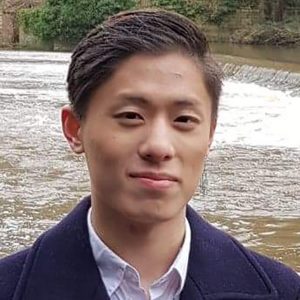
he/him/his
Class of 2022
Economics and Political Science majors
Center for Urban and Regional Affairs, Coalition of Asian American LeadersThis summer, I partnered with the Center for Urban and Regional Affairs (CURA) and conducted research for the Coalition of Asian American Leaders (CAAL). CURA, a research organization within the University of Minnesota, connects students with community organizations to research relevant local issues. I was thus connected with CAAL to research inequality and hardship within the diverse Asian Minnesotan community.
My research involved two parts. For the first half of summer, I focused on assisting and transcribing interviews and focus groups with different ethnic groups. I then analyzed the transcripts and identified prevalent themes in the stories of community members. Second, I helped organize the analysis into a coherent research paper that informs policy recommendations.
Throughout the summer, both CURA and CAAL provided me with ample support, despite the remote setting and time zone difference (the pandemic had stranded me in the U.K.). Most importantly, they helped me stay grounded in the Asian Minnesotan community while I was completing the fellowship remotely from another country. I was constantly reminded to make my research and writing accessible to stakeholders outside of academia, such as policymakers and community members. This aspect of the research process gave me a unique experience unparalleled by typical academic writing.
Overall, I had a great experience with CURA, despite the experience being entirely remote. While I wish that this experience could have included in-person components, I could not have asked for a more educational and eye-opening project.